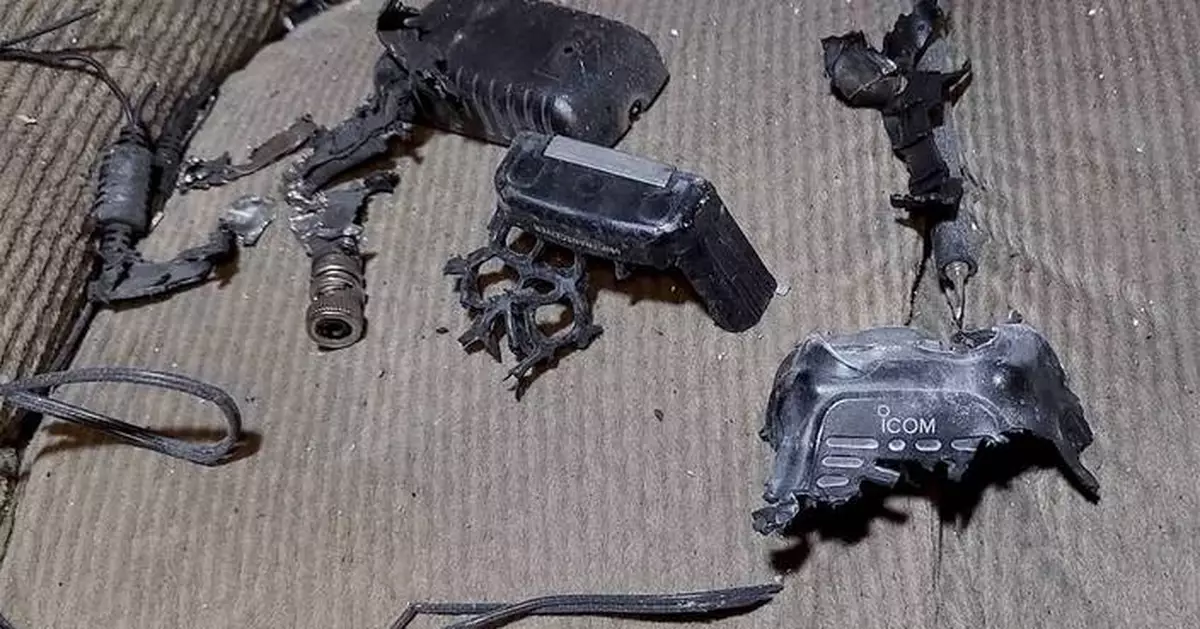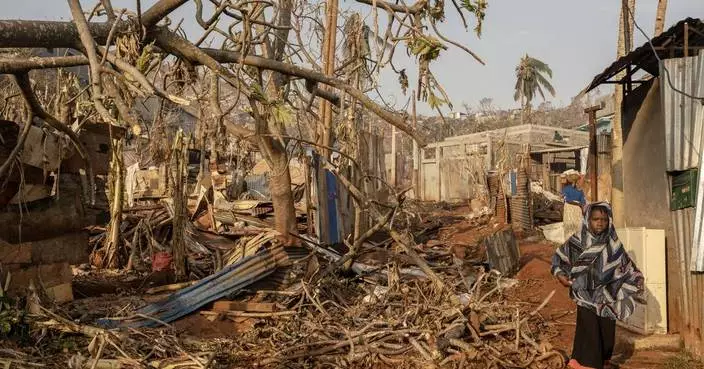UNITED NATIONS (AP) — Weaponizing ordinary communication devices represents a new development in warfare, and targeting thousands of Lebanese people using pagers, two-way radios and electronic equipment without their knowledge is a violation of international human rights law, the United Nations human rights chief said Friday.
Volker Türk told an emergency meeting of the U.N. Security Council there must be an independent and transparent investigation of the two attacks in Lebanon on Tuesday and Wednesday where these devices exploded, reportedly killing 37 people and injuring more than 3,400 others.
“Those who ordered and carried out these attacks must be held to account,” he said.
Lebanon has blamed Israel for the attacks, which appeared to target Hezbollah militants but also saw many civilian casualties, including children. Hezbollah has fought many conflicts with Israel, including a war in 2006, and it has conducted near-daily strikes against Israel to support Hamas militants who attacked Israel on Oct. 7.
Before the council meeting, Israel’s U.N. Ambassador Danny Danon was asked by reporters about speculation Israel was behind the two explosions.
“We are not commenting on the specific attacks you mentioned, but I can tell you that we will do everything we can to target those terrorists to minimize casualties for civilians,” he replied.
Lebanon’s Foreign Minister Abdallah Bouhabib accused Israel of terrorizing the entire Lebanese population on streets, in markets, shops and their homes where their communications devices exploded.
He held up a photo of a mangled and bloodied hand, telling ambassadors from the 15 council nations: “Look at the ugliness of what has happened in this picture.”
Bouhabib insisted that Israel not only launched the attacks but told the council there were “official declarations” and a tweet by an adviser to Prime Minister Benjamin Netanyahu “that was lately deleted, emphasizing the responsibility of Israel and praising the positive results of this assault.”
He appeared to be referring to a deleted tweet by Netanyahu adviser Topaz Luke, who reportedly retweeted a post that included a reply indicating that Israel was behind the attacks in Lebanon and neighboring Syria.
Israel’s Danon criticized the Lebanese minister for never mentioning Hezbollah and said the Lebanese people are “trapped in the grip of this terrorist organization.”
Lebanon’s Bouhabib warned the council that if it doesn’t condemn the week’s deadly explosions and name Israel as the perpetrator, a “Pandora’s Box” will be opened, and governments and extremists will target, terrorize and kill civilians with similar communications devices on trains, planes and elsewhere.
Türk, the U.N. high commissioner for human rights, said the explosions not only violated international human rights law but also appear to violate international humanitarian law’s key principles in carrying out attacks: distinction between civilians and combatants, proportionality, and precautions.
International law also prohibits the use of booby-trap devices that look harmless, he said, and “it is a war crime to commit violence intended to spread terror among civilians.”
“Let me be clear — this method of warfare may be new and unfamiliar,” Türk said, “but international humanitarian and human rights law apply regardless and must be upheld.”
Israel’s Danon blamed Iran and its “puppet” Hezbollah for the military action across the Lebanon-Israel border.
“While Israel is not seeking a wider conflict, let me be clear: We will not allow Hezbollah to continue its provocations,” he said. Israel will do “whatever it takes” to return its 60,000 citizens who fled their homes in the north because of attacks, “and we will not allow Hezbollah’s terror to dictate the future of our nation.”
Iran’s U.N. Ambassador Amir Saeid Iravani countered that “Israel bears full responsibility for the perpetration of such horrific crimes,” and said his government will pursue accountability for the attack on the country’s ambassador to Lebanon, whose eyes were injured in the explosions Tuesday.
He said the gravity of the attacks against the Lebanese people must also be seen as “a threat to peace and security across the region.” He added that “the international community must not ignore the role the Western countries, in particular the United States and U.K., play in enabling Israel’s aggressions.”
U.N. political chief Rosemary DiCarlo warned the council that the explosions along with more than 11 months of bloodshed in Gaza, and near-daily exchanges of fire across the Israel-Lebanon border, pose a grave risk to security and stability in the region.
She urged all actors to exercise maximum restraint, and she strongly urged countries with influence on the parties “to leverage it now.”
Earlier, U.N. spokesperson Stephane Dujarric urged Israel and Hezbollah to immediately return to the cessation of hostilities that existed before Hamas’ Oct. 7 attacks in southern Israel and Israel's responding military campaign in Gaza, warning that “the region is on the brink of a catastrophe” and a diplomatic solution should be pursued urgently.
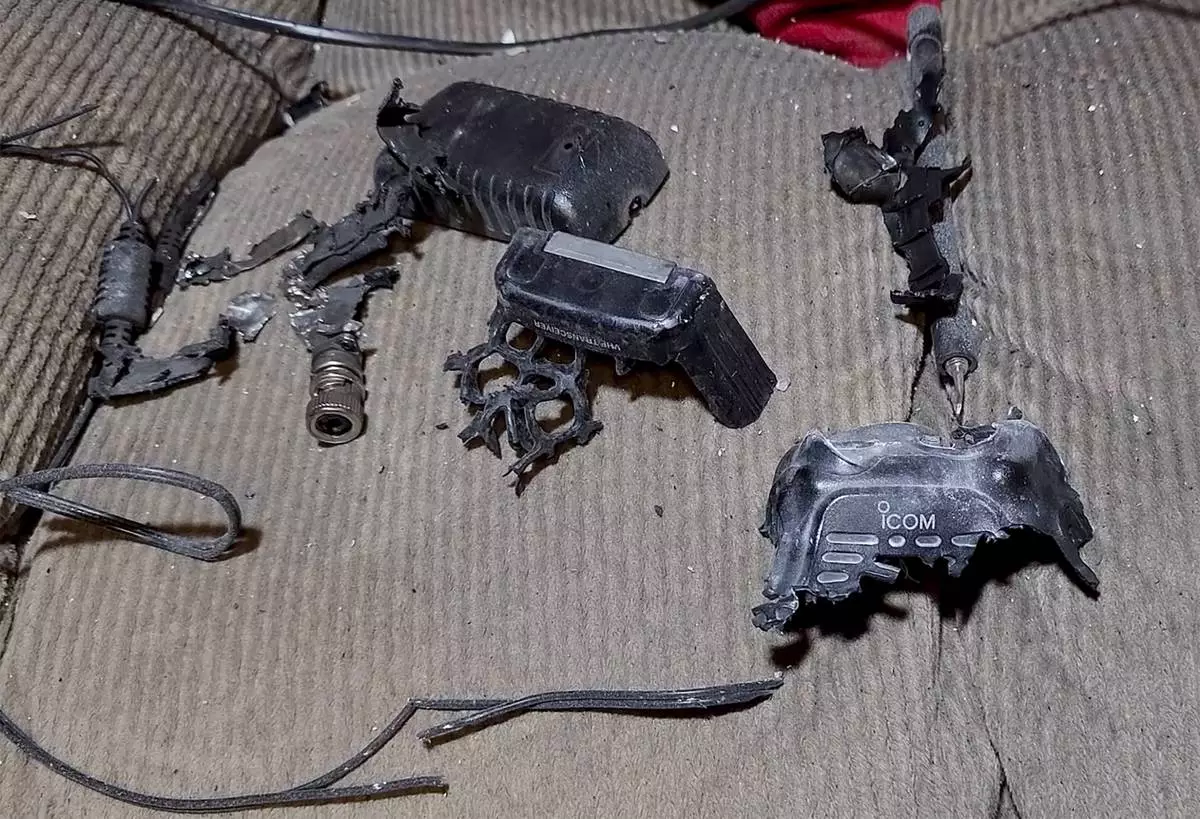
This video grab shows a walkie-talkie that was exploded inside a house, in Baalbek, east Lebanon, Wednesday, Sept. 18, 2024. (AP Photo)
TEL AVIV, Israel (AP) — A rocket fired from Yemen hit an area of Tel Aviv overnight, leaving 16 people slightly injured by shattered glass, the Israeli military said Saturday, days after Israeli airstrikes hit Houthi rebels who have been launching missiles in solidarity with Palestinians.
A further 14 people sustained minor injuries as they rushed to shelters when air raid sirens sounded before the projectile hit just before 4 a.m. Saturday, the military said.
The Houthi rebels issued a statement on the Telegram messaging app saying they had aimed a hypersonic ballistic missile at a military target, which they did not identify.
The attack comes less than two days after a series of Israeli airstrikes on Yemen’s Houthi rebel-held capital, Sanaa, and port city of Hodeida killed at least nine people. The Israeli strikes were in response to a Houthi attack in which a long-range missile hit an Israeli school building. The Houthis also claimed a drone strike targeting an unspecified military target in central Israel on Thursday.
The Israeli military says the Iran-backed Houthis have launched more than 200 missiles and drones during the Israel-Hamas war in Gaza. The Houthis have also been attacking shipping in the Red Sea and Gulf of Aden and say they won’t stop until there is a ceasefire in Gaza.
The Israeli strikes Thursday caused “considerable damage” to the Houthi-controlled Red Sea ports “that will lead to the immediate and significant reduction in port capacity,” U.N. spokesman Stephane Dujarric said. The port at Hodeida has been key for food shipments into Yemen in its decade-long civil war.
U.N. Secretary-General Antonio Guterres said both sides’ attacks risk further escalation in the region and undermine U.N. mediation efforts.
In the Gaza Strip on Saturday, mourners held the funerals of 19 people — 12 of them children — killed in Israeli strikes on Friday and overnight.
One of the strikes hit a residential building in the built-up Nuseirat refugee camp in central Gaza, killing at least seven Palestinians, including five children and one woman, and injuring 16 others, health officials said.
In Gaza City, another strike on a house overnight killed 12 people, including seven children and two women, according to Al-Ahli Hospital where the bodies were taken.
Mourners gathered at the hospital in Gaza City Saturday morning. Women comforted each other as they wept over the bodies before they were carried away. One man, stony-faced, cradled a tiny shroud-wrapped body in his arms as he carried it along the funeral procession.
In Al-Aqsa Hospital of Deir al Balah, white body bags containing those killed in Nuseirat were taken from the morgue and loaded onto the back of an open truck to be taken for burial.
Overall, Gaza's Health Ministry said Saturday that 21 people had been killed and 61 were wounded over the past 24 hours.
Israel faces heavy international criticism over the unprecedented levels of civilian casualties in Gaza and questions about whether it has done enough to prevent them.
Israel says it only strikes militants, and blames the Hamas militant group for civilian deaths because its fighters operate in residential areas.
More than 45,200 people have been killed and more than 107,500 wounded in the Gaza Strip since October 2023, when a Hamas attack in Israel killed about 1,200 people and triggered the devastating 14-month war in Gaza. Local health officials do not distinguish between civilians and combatants, but have said more than half of the fatalities are women and children.
The Israeli military organization dealing with humanitarian affairs for Gaza said Saturday it had led a “tactical coordinated operation” delivering thousands of food packages, flour and water to the Beit Hanoun area in the north of the Gaza Strip.
The organization, known by its acronym COGAT, said trucks from the U.N. World Food Program transported 2,000 food packages, 1,680 sacks of flour and thousands of liters of water to distribution centers in the area on Friday.
Aid groups have said previously that military operations and armed gangs have hindered their ability to distribute aid to civilians in need.
Gaza's Health Ministry issued an urgent appeal Saturday for medical and food supplies to be delivered to Kamal Adwan Hospital in Beit Lahia, near Beit Hanoun in northern Gaza, while the hospital director described dire conditions.
The ministry said in a statement that there was continuous gunfire and Israeli shelling near the hospital. “Shells have struck the third floor and the hospital’s entrances, creating a state of panic,” the ministry said.
Hospital Director Dr. Husam Abu Safiyeh said the facility was “facing severe shortages."
“Despite promises, we have not received the necessary supplies to maintain electricity, water, and oxygen systems," Abu Safiyeh said. "Our requests for essential medical supplies and staff have largely gone unmet.”
He said the World Health Organization had delivered 70 units of blood, but that the hospital requires at least 200 units to meet urgent needs. He said 72 wounded people were being treated at the hospital.
The shortages extend beyond medical necessities. “Food is very scarce, and we cannot provide meals for the wounded. We are urgently calling on anyone who can provide supplies to help us,” he said. “The staff is working around the clock, yet we cannot even provide meals for them.”
Shurafa reported from Deir al Balah, Gaza Strip. Associated Press writers Elena Becatoros in Majdal Shams, Golan Heights, contributed to this report.
Follow AP’s war coverage at https://apnews.com/hub/israel-hamas-war
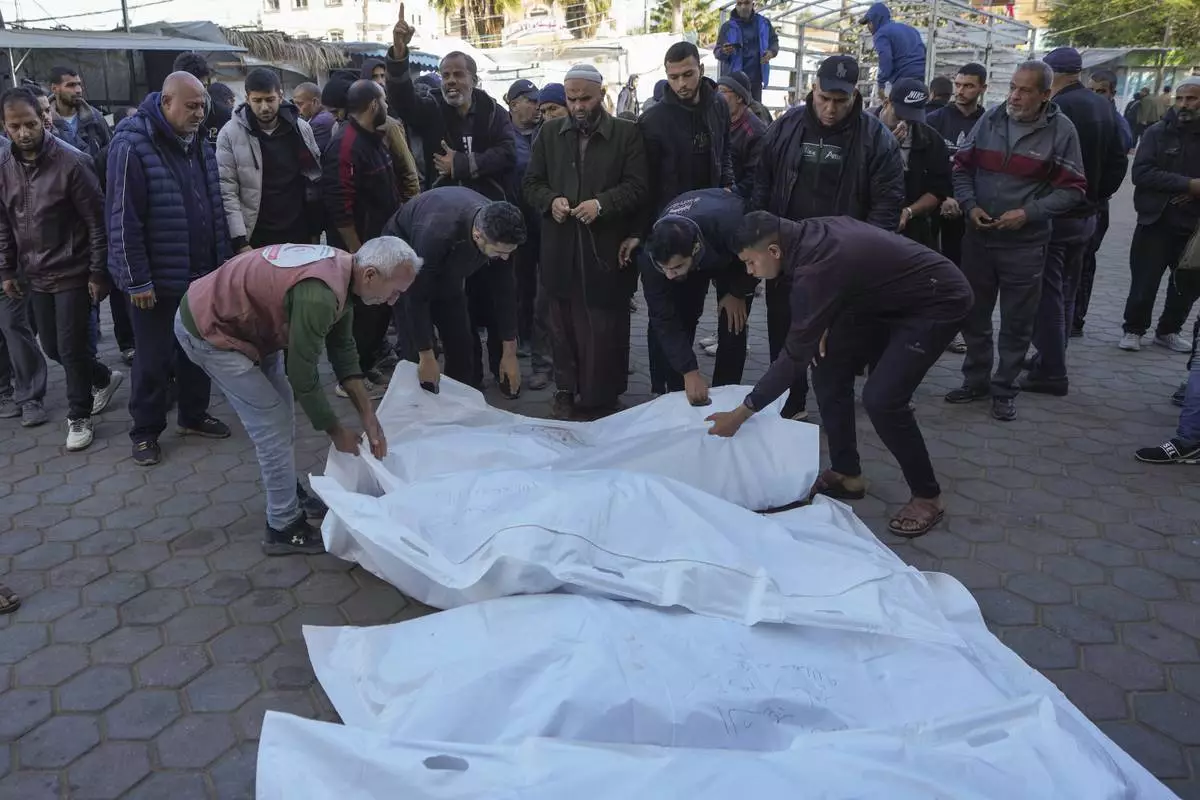
Bodies of victims of an Israeli airstrike at the Nuseirat refugee camp are prepared for the funeral prayer outside the Al-Aqsa Martyrs hospital in Deir al-Balah, Gaza Strip, Saturday, Dec. 21, 2024. (AP Photo/Abdel Kareem Hana)
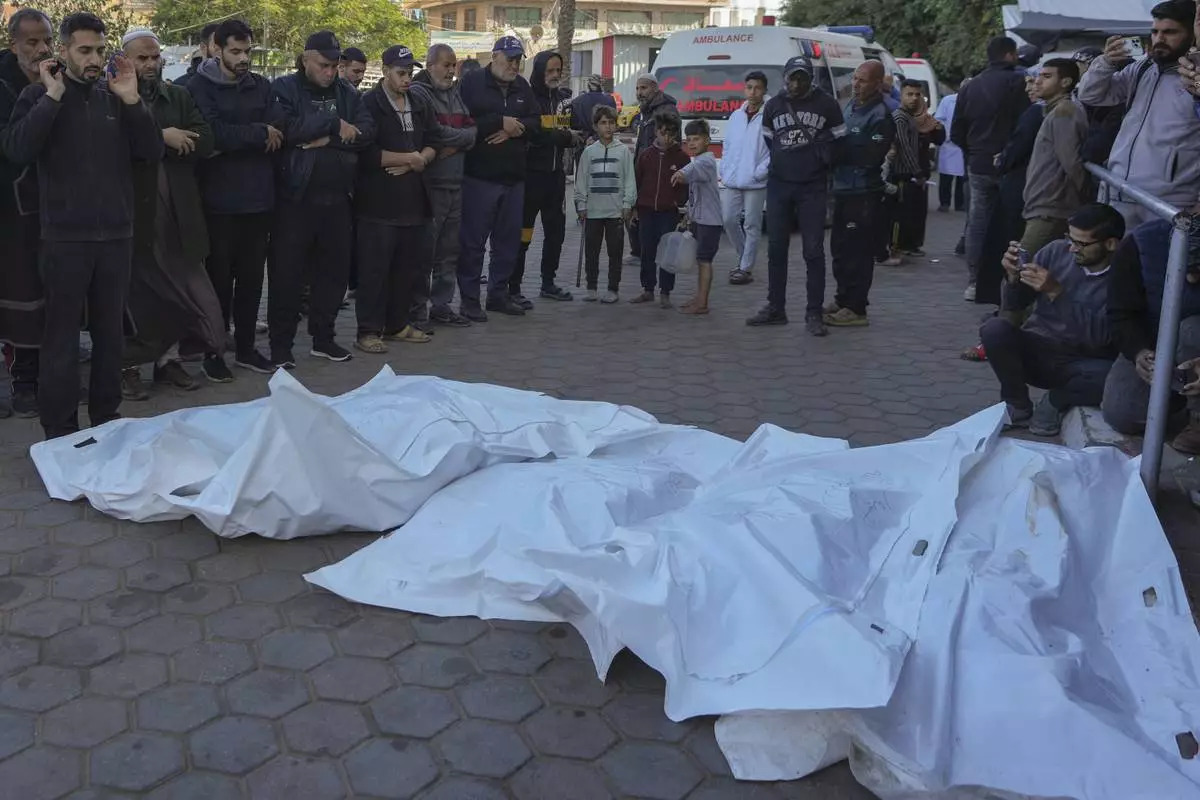
Men pray over the bodies of victims of an Israeli airstrike at the Nuseirat refugee camp during a funeral prayer outside the Al-Aqsa Martyrs hospital in Deir al-Balah, Gaza Strip, Saturday Dec. 21, 2024. (AP Photo/Abdel Kareem Hana)
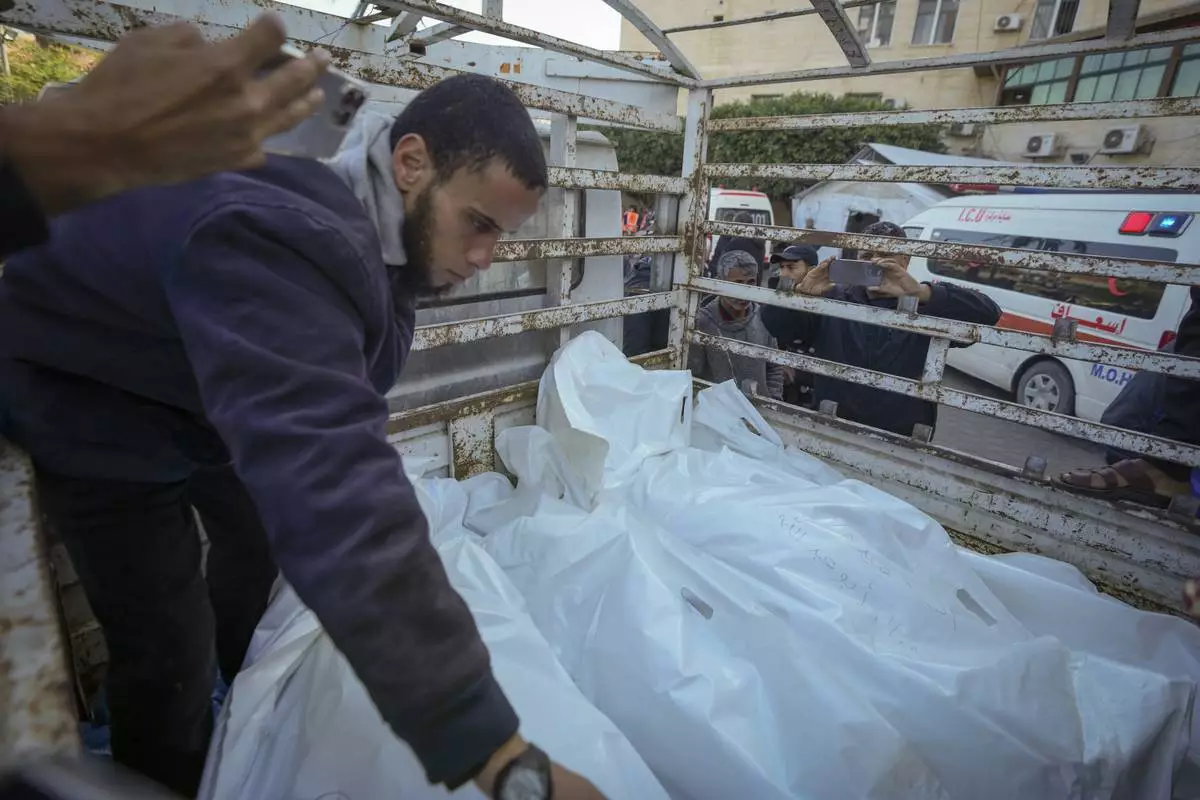
Bodies of victims of an Israeli airstrike at the Nuseirat arrive at the Al-Aqsa Martyrs hospital before their funeral in Deir al-Balah, Gaza Strip, Saturday, Dec. 21, 2024. (AP Photo/Abdel Kareem Hana)
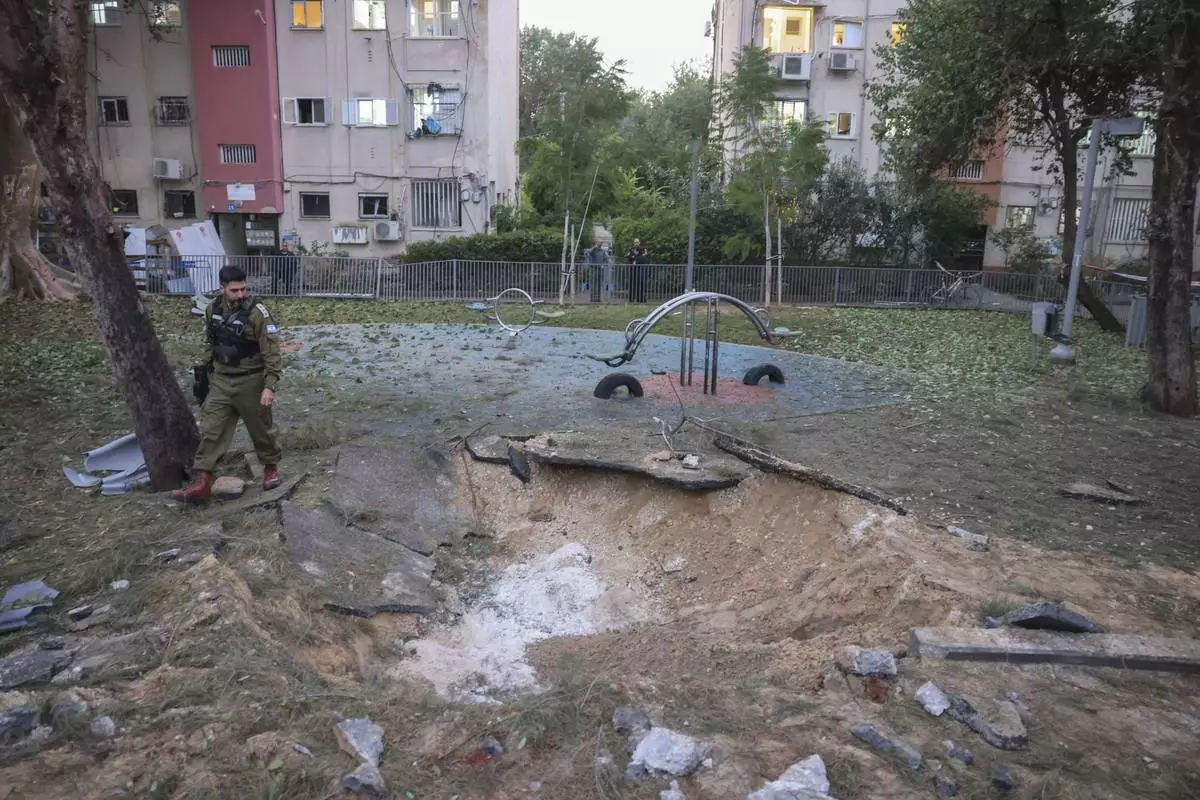
An Israeli soldier observes the site where the missile launched from Yemen landed Jaffa district, in Tel Aviv, Israel, Saturday, Dec. 21, 2024. (AP Photo/Tomer Appelbaum)



